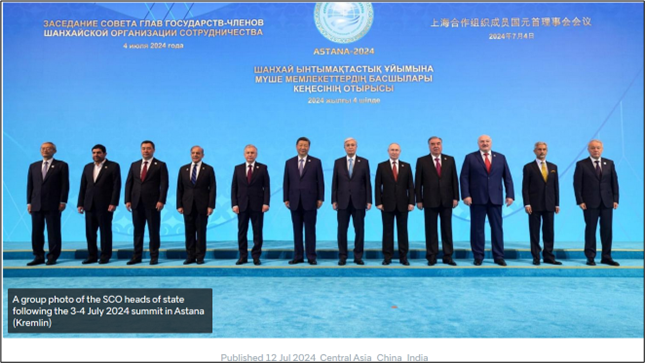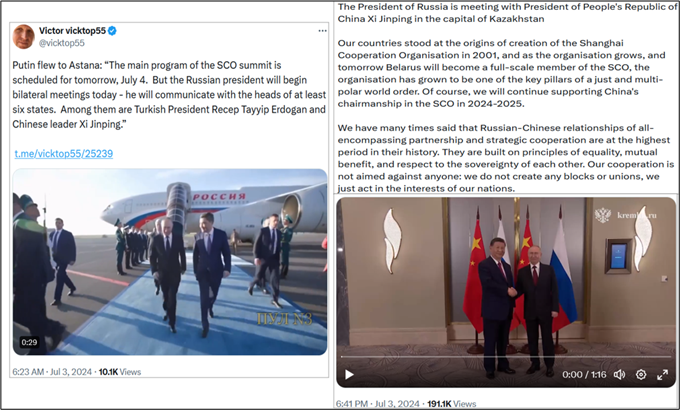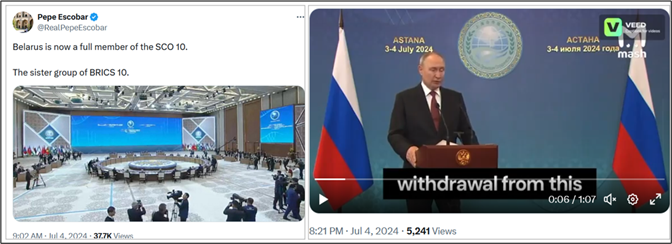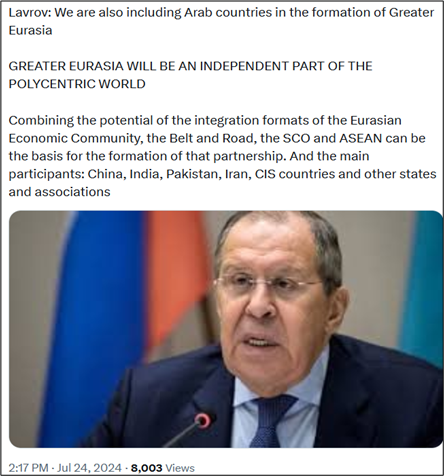SCO overview 2024
As I mentioned in my previous article “BRICS overview 2024”, July 22, 2024, in addition to BRICS there are also certain other “strengthening important entities”: SCO (Shanghai Cooperation Organization), BRI (Belt and Road Initiative), EAEU (Eurasian Economic Union) and Greater Eurasian Partnership. All these entities have been explained in the article “BRICS Summit – its importance and aftermath” of August 28, 2023.
I have published an article “Samarkand calling” September 20, 2022, where you can find a large background information of SCO.
The SCO (Shanghai Cooperation Organization) in short: founded on June 15, 2001, in Shanghai. Initially the organization included Russia, Kazakhstan, Kyrgyzstan, China, Tajikistan and Uzbekistan, in 2017 they were joined by India and Pakistan. Iran applied to join in 2008 and became a full-fledged member of the organization in July 2023. Belarus is expected to join the group soon.

Kremlin Aide Yury Ushakov described SCO and BRICS as “locomotives in the context of establishing genuine multilateralism in global affairs”. Russia considers SCO and BRICS as backbones of new international order.
The president’s aide also noted that SCO already integrates 26 countries, including ten member-states (considering Belarus that will join the organization at the summit), two observers and 14 dialogue partners. Beijing will assume the rotating chairmanship of the SCO for 2024-2025, he added. “We will closely cooperate with our Chinese partners. The more so as this year, for the rest of the year, Russia chairs BRICS, meaning China will chair one organization starting July, while Russia will chair the other one,” he said.
Ministerial meeting of SCO, May 20 – 21, 2024, Astana, Kazakhstan
The SCO foreign ministers discussed preparations for the organization’s summit due to be held on July 3 and 4, as well as topical international topics. Special attention focused on the prospects for the organization’s further development and its adaptation to the formation of a new world order. Russian Foreign Minister Sergey Lavrov held a number of bilateral meetings.
The ministers agreed upon a package of documents to be signed by the heads of state. The July 3-4 summit is expected to endorse Belarus’ admission to the SCO as its full-fledged member. The ministers also discussed the situation in the Gaza Strip and in the Middle East in general, as well as issues of promoting stabilization in Afghanistan, combating terrorism and drug threats.
Summit of SCO in Astana on 3 – 4 July, 2024
The SCO summit is scheduled to be held on July 4 at the Palace of Independence in Astana, Kazakhstan. SCO Secretary General Zhang Ming will attend the summit as well UN Secretary-General Antonio Guterres and the leaders of several international organizations, which were also invited.

First day, bilateral meetings
On Wednesday, July 3, the first day of the summit, the head of states held a series of bilateral talks. Russian President Vladimir Putin has opened a series of bilateral meetings on the sidelines of the SCO summit in Astana, starting with talks with his Mongolian counterpart Ukhnaagiin Khurelsukh. Putin is scheduled to hold talks with the heads of at least six countries, namely Azerbaijan, Kazakhstan, China, Turkey and Pakistan. A meeting with the Iranian acting president will also take place. Besides, Putin may talk to UN Secretary General Antonio Guterres.

Foreign ministers of Russia, China and Mongolia, Sergey Lavrov, Wang Yi and Battsetseg Batmunkh, reaffirmed their interest in integrating joint economic projects, the Russian Foreign Ministry said in a statement. “We are interested in interconnecting the development of trilateral projects with the activities of the Eurasian Economic Union, with China’s implementation of BRI and with Mongolia’s Steppe Road Plan,” the Russian minister said in his introductory remarks from the ministerial meeting held on the sidelines of the summit. “This reflects our common interests and will contribute to harmonizing various information processes as part of creating the Greater Eurasian Partnership. I expect us to make a contribution into these efforts today,” Lavrov added.
On the second day, head of states and delegations participate in the SCO Summit.
Agenda of the meeting
Participants of the event recap the organization’s work in 2023-2024. They also consider further strengthening of the organization and promotion of cooperation in the areas of politics, security, economy and humanitarian ties. Besides, the heads of state exchange views on pressing issues on the international and regional agenda.
Putin and other SCO leaders signed documents on the admission of the Republic of Belarus to the organization. Belarus officially became a member of the SCO. Kazakh President Tokayev said that Belarus completed all the necessary procedures in the shortest possible time to obtain the status of a full member of the organization.
During the Council meeting, reports were heard from the heads of the SCO standing bodies: the organization’s secretary general, Zhang Ming and the director of the Regional Anti-Terrorist Structure Ruslan Mirzayev.
Twenty-four documents are to be adopted at the SCO summit. The central final document is the declaration of the SCO Council of Heads of State. The document will reflect the consolidated approaches of the participating countries on current regional and international problems. The heads of state are also expected to adopt a Statement on the Principles of Good Neighborliness, Trust and Partnership.
The leaders will also sign a decision on the approval of the initiative “On World Unity for a Just Peace and Harmony,” which is designed to “confirm the commitment to the formation of the most representative, democratic, fair, multipolar world order with the central coordinating role of the UN.”
SCO Plus format
The first meeting of the SCO Plus format on the sidelines of the SCO summit will also be held on July 4 in Astana. The topic of the meeting is “Strengthening multilateral dialogue – the pursuit of sustainable peace and development.”
Among those who were invited to the first meeting in the SCO plus format are President of Azerbaijan Ilham Aliyev, Emir of Qatar Sheikh Tamim bin Hamad Al Thani, President of Mongolia Ukhnaagiin Khurelsukh, President of Turkey Tayyip Erdogan, the ruler of the emirate of Ras Al Khaimah, a member of the Supreme Council of the Emirates Sheikh Saud bin Saqr Al Qasimi and Chairman of the People’s Council of Turkmenistan Gurbanguly Berdimuhamedov.
UN Secretary-General Antonio Guterres and the leaders of several international organizations were also invited, including CIS Secretary General Sergey Lebedev and Secretary General of the Collective Security Treaty Organization (CSTO) Imangali Tasmagambetov.

President Putin spoke to reporters following the SCO summit, key excerpts
Development of cooperation within the SCO
Russia attaches great importance to cooperation within the SCO, which continues to develop progressively on the principles of equal rights, consideration of each other’s interests, respect for cultural and civilizational diversity and the search for collective solutions to pressing security issues. A really solid package of documents and decisions has been prepared for approval by the current SCO Council of Heads of State, the implementation of which will undoubtedly contribute to strengthening the role and influence of the organization.
Security and combating terrorism
The security of the SCO member states remains a priority task. In order to fulfill it, the organization’s regional anti-terrorist agency will be transformed into a universal center that will deal with the entire spectrum of security threats. The program of cooperation in this area approved at the summit will also contribute to the fight against separatism and extremism in the SCO area.
The new security paradigm in Eurasia proposed by Russia is designed to replace outdated Euro-Atlantic models. The Russian Federation is ready to respond in the same way in the event of the deployment of American medium- and shorter-range missiles in any region of the world.
Multipolar world
Changes in the world order are occurring rapidly and irreversibly, the multipolar world is officially here. The SCO and BRICS “act as a powerful engine of global development processes and the establishment of true multipolarity.” Today, as the world goes through rapid and irreversible changes, the SCO’s proactive position in international affairs is much needed. A multipolar world is already a reality.
Along with BRICS, the Shanghai Cooperation Organization is a pillar of the emerging world order. These two organizations serve as a powerful driving force behind global development processes and efforts to ensure true multipolarity. The SCO’s initiative “On Global Unity for a Just World and Harmony” marks a step towards multipolarity. The initiative is clearly aimed at developing measures of trust particularly in the field of stability and security, primarily in our common Eurasian region.
Economic cooperation
Close economic ties in the SCO space are paying clear dividends for the participants of the organization: The facts speak for themselves. The draft decision on the development strategy of the association until 2035 outlines the prospects for further deepening cooperation not only in politics and security, but also in the economy, energy, agriculture, high technology and innovation.
Use of national currencies: The SCO nations are increasing the use of national currencies in mutual settlements, their share in Russia’s commercial transactions with the members of the organization has already exceeded 92% in the first four months of 2024.
Ukraine
Ending the conflict with Ukraine through mediators is not likely, Putin believes but Moscow welcomes mediation itself. Russia takes seriously Trump’s statements about the possibility of stopping the Ukrainian conflict. It is impossible to talk about establishing a constructive dialogue with the United States before elections are held there. The crisis in Ukraine arose due to “the policy of the United States and its satellites.” The peace plan proposed by Russia would allow for an immediate cessation of fighting and the start of negotiations, if Kiev and the West are ready.
The Middle East
History has shown the unviability of US attempts to “cut the Palestinian knot.” Two-state solution is the only viable.
Youth networks
The SCO Youth Council, established at Russia’s initiative, plays a coordinating role in promoting dialogue among young people. The member countries of the organization are consistently increasing cooperation on the cultural and humanitarian tracks: The SCO University, which unites 77 universities from our countries, is doing good work.
Some other conclusions
The summit of the Shanghai Cooperation Organization (SCO) ended in Astana. The list of participants included: leaders of Russia, China, Mongolia (observer), Azerbaijan (observer), Pakistan, Tajikistan, Uzbekistan, Turkey (by invitation as a guest), Qatar (by invitation), Kyrgyzstan, Belarus, Turkmenistan (by invitation), as well as Indian Foreign Minister Subrahmanyam Jaishankar and UN Secretary-General Antonio Guterres.
SCO Summit showsAsia’s determination to build multipolar world, Western voice no longer decisive. It also shows that the organization understands the threats to its security. The SCO positions itself as an organization that, in addition to developing regional economic ties, strengthens the security of member countries and struggles against terrorism and drug trafficking.
Following the results of the 24th summit, SCO participants signed the Astana Declaration and according to this document:
1. The SCO regional anti-terrorist structure will be transformed into a universal center and the center will respond to the full range of security threats.
“The security of member countries remains a priority for the SCO,” President Vladimir Putin said. “The SCO must protect its right to development and stimulate regional economy. We must resist external interference hand in hand and provide each other with strong support,” said Chinese President Xi Jinping and called on the association countries to increase the exchange of intelligence data.
2. A Center for Combating Drug Trafficking has been created in Tajikistan’s Dushanbe.
“The government of the country will create all necessary conditions for the effective operation of this structure,” Tajik President Emomali Rahmon said.
3. The tenth participant has been accepted — Belarus. For a country bordering the West, this is another means of protection, as well as an economic connection to new North-South transport corridors.
Thus, the SCO summit has laid the foundation to a new Eurasian security system that will restrain NATO’s aggressiveness.
Two other security issues were also discussed in Astana. Regarding Ukraine: Putin said that Russia proposed its plan to end the hostilities but Moscow would take into account the proposals from its SCO partners. Regarding India-China border issue: India and China agreed to begin negotiations to resolve problems along their borders, the Indian Foreign Minister said in a statement. The image of the SCO power bloc will depend on how border problems in the China-India-Pakistan triangle are going to be resolved.
Western media emphasize that the absence of Indian Prime Minister Narendra Modi at the summit in Astana was supposedly a signal of trouble within the bloc. They also report that the SCO has supposedly lost its former regional significance with the accession of Belarus. According to the representatives of the summit, the purpose of this pressure is to isolate Russia, punish China, belittle the importance of Central Asian countries and win India over to its side.
However, the expanded format of the summit with the participation of the UN Secretary General suggests that Asia is determined to build a multipolar world with the support of the UN. Several countries want to change their status in the SCO and work more closely with the association, the group’s Secretary-General Zhang Ming told to the media.
Cambodia, Sri Lanka, Armenia and Azerbaijan applied to change their status from dialogue partner to observer. This change is usually considered a stepping stone on the way to full-fledged membership in the organization. Additionally, Bangladesh would like to become an observer.
The participation of Armenia and Azerbaijan, located in the Caucasus region, in an integration project like the SCO, could positively impact the structure of the region’s security in general and the Eurasian region in particular. Cambodia, Sri Lanka and Bangladesh in Southeast Asia are considered rather important regional countries and, given that the situation is unstable in a number of their neighboring states, they can add to security and stability in the region.

Value and meaning of SCO Summit in the framework of great power relations
Starting from Shanghai Five
It has been a long way from the original Shanghai Five back in 2001 (China, Russia, Kazakhstan, Kyrgyzstan, Tajikistan, Uzbekistan) to the present Shanghai Cooperation Organization (SCO) as a serious geoeconomic cooperation bloc.
The alliance’s main goal was to prevent border disputes among members. The other objectives of the SCO are to strengthen trust among member states, to participate and cooperate in political, scientific-technical, cultural, tourism and ecological areas, in the areas of trade, energy and transport, and to jointly ensure and support peace and security within and between the regions of member countries and the resolution and resolution of conflicts.
The summit in Astana showed how the SCO has really stepped up the game after incorporating India, Pakistan and Iran and now Belarus as new members, plus establishing key players such as Turkey, Saudi Arabia, UAE, Qatar and Azerbaijan as dialogue partners and strategic Afghanistan and Mongolia as observers.
Current progress
The importance of the 2024 summit of SCO in Astana, can be considered as a prelude to the crucial BRICS annual summit, under the Russian presidency, next October in Kazan.
SCO members see “tectonic shifts are underway” in geopolitics and geoeconomics. That multipolar, political and economic international order they support, is in a sharp contrast with the unilaterally-imposed “rules-based international order” the US and its allies support. Moreover, they agree that “interaction within the SCO may become the basis for building a new security architecture in Eurasia.”
The two crucial points are military and economic: “To gradually phase out the military presence of external powers” in Eurasia; and to establish alternatives to “Western-controlled economic mechanisms, expanding the use of national currencies in settlements and establishing independent payment systems.”
The focus of “world affairs” has moved to east, Russian recent maneuvers in Eurasia are, de facto, linking security in Asia as indivisible with security in Europe. It appears that this process has continued without the West noticing anything special. A new Eurasia-wide security architecture is an upgrade of the Russian concept of Greater Eurasian Partnership – involving a series of bilateral and multilateral guarantees. The SCO should become one of the key drivers of this new security arrangement alongside the CSTO, the CIS and the Eurasia Economic Union (EAEU).
China and Russia, stated by the president Xi and Putin, doubled down, when it comes to the leading Russia-China strategic partnership: both should “strengthen comprehensive strategic coordination, oppose external interference and jointly maintain peace and stability” in Eurasia. They are welcoming the progress of SCO+, “the long-term goals for further expansion of cooperation in politics, economy, energy, agriculture, high technologies and innovation are stated in the project of development strategy of SCO till 2035.” Russia and China are the leaders of Eurasia integration and the drive towards a multipolar world.
The SCO now goes way beyond a Heartland-focused economic and security alliance, as it covers 80% of the Eurasian landmass; accounts for more than 40% of the world’s population; boasts a 25% share of global GDP; and generates global trade value of over $8 trillion in 2022, according to Chinese government numbers. Add to it SCO members hold 20% of global oil reserves and 44% of natural gas.
Astana once again revealed how the main drivers of the SCO are advancing fast from energy cooperation to cross-border transportation corridors. Putin and Xi discussed progress in the construction of the massive Power of Siberia 2 gas pipeline as well as Central Asia’s need to have China as a provider of funds and technology to develop their economies.
The road map ahead of course includes socio-economic integration and the development of international transportation corridors – from the INSTC (Russia-Iran-India) to the China-supported “Middle Corridor”.
China is now Kazakhstan’s largest trading partner. Crucially, when Xi met Kazakh President Kassym-Jomart Tokayev, he backed Kazkh’s bid to join BRICS+ and that means more projects under Chinese BRI. Kazakhstan is central on all these fronts: BRI, SCO, EAEU, soon BRICS and last but not least, the Trans-Caspian International Transport Route. That’s the famous Middle Corridor linking China to Europe via Kazakhstan, the Caspian Sea, Georgia, Turkey and the Black Sea.
The strategically important China-Kyrgyzstan-Uzbekistan railway – a BRI project – developed slowly, but now will be on overdrive, by a mutual Putin-Xi decision. Moscow knows that Beijing – fearing the sanctions tsunami – cannot use the Trans-Siberian as the main overland trade route to Europe. So, the new Kyrgyzstan-Uzbekistan railway is the solution, reducing the journey to Europe by 900km. Moscow now fully supports interconnected projects launched by BRICS and/or financed by the EAEU. The SCO Development Bank, which was initially proposed by China is now also supported by Russia.
From Now On
Moscow and Beijing see the new evolving multipolarreality – SCO and SCO+, BRICS 10 and BRICS+, EAEU, ASEAN, INSTC & other corridors, new trade settlement platforms, the new Eurasian security architecture as well as Sino-Russian bilateral cooperation – as “the Eastern Juggernaut” in the complex, long-term strategy of meticulously shattering the domination of the US hegemon worldwide.
The US sees the SCO as an anti-Western alliance. Due to the conflict in Ukraine, Russia, as a member state of the SCO, is now in direct conflict with the West. The discussion about Taiwan is also bringing China increasingly into conflict with the US and its allies. So, it can be said that the SCO is an anti-Western alliance, not because of the founding idea but as a reaction to “Western provocations”.
In particular, Belarus’ accession to the SCO can be seen as a clear expansion of this organization’s influence in Europe. It is likely that other states will join the alliance or at least cooperate with it. Western commentators criticize the SCO for not being organized strongly enough but the crucial question is whether it will remain an eastern alliance with a focus on Asia and Eastern Europe or whether it will also include states from other continents.
If the organization expands its activities to Africa and Latin America, this will also affect the global interests of the individual European states. We can see what problems Europe’s former colonial powers are already having in Africa. A greater influence of the SCO member states in Africa could lead to further tensions between West and East in the long term.
Europe’s supply of raw materials is massively dependent on developments in Africa. Who will influence the construction of a new security architecture in Africa? Europe or the countries of the Asian continent? But it is now clear that activities of organizations such as BRICS and SCO will have a major impact on Africa’s future.
In the long term, of course, is also crucial how the BRICS alliance will develop. If BRICS continues to focus on security policy aspects in the future, the SCO could lose its importance. The further development of BRICS will greatly influence the future status of the SCO. It will also decide whether the SCO will remain a regional organization or whether it could play a global role in the interests of the member states.


